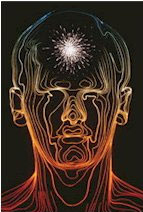 I have always been intrigued by superhuman feats of cognition. It's truly amazing what some people are capable of, be they math geniuses or musical prodigies. Moreover, from the perspective of neuroengineering, it's quite interesting to see how, given a minor tweak here or there, the brain is truly capable of extreme mental feats.
I have always been intrigued by superhuman feats of cognition. It's truly amazing what some people are capable of, be they math geniuses or musical prodigies. Moreover, from the perspective of neuroengineering, it's quite interesting to see how, given a minor tweak here or there, the brain is truly capable of extreme mental feats.Take some autistic savants, for example. Most autistic savants have what are called 'splinter skills' that allow them to memorize facts, numbers, license plates, maps, and extensive lists of sports and weather statistics. Some can mentally note and then recall back perfectly a very long series of music, numbers, or speech.
Some, the so-called 'mental calculators', can do lightning-fast arithmetic calculations, including finding prime factorizations. Other skills include precisely estimating distances by sight, calculating the day of the week for any given date over the span of tens of thousands of years, and perfect perception of passing time without a clock.
One notable autistic savant is Kim Peek, who can recall about 9,600 books from memory.
It's amazing to think that Kim Peek's talent is likely the result of a minor genetic tweak or two in the brain (i.e. a mutation), and that the neurotypical brain, or the brain in its 'natural' or default state, is not too far removed from Peek's.
Consequently, it's quite likely that in the early stages of neuroengineeing these sorts of augmentations will not be too difficult to bring about. The trick will be to create cognitively gifted people without the side-effects, namely autism and other psychological disorders (and yes, I'm claiming that autism is a disability for all those in the autistic rights movement).
Strangely, however, why autistic savants are capable of these extraordinary feats is not quite clear. Some savants have obvious neurological abnormalities, but the brains of most such individuals appear anatomically and physiologically normal.
While not exclusive to autistic savants, extreme memory is one particular example of what the human brain is capable of. Individuals with an extreme ability for recall have what is called 'eidetic memory.' Just last year, for example, Akira Haraguchi managed to recite pi's first 83,431 decimal places from memory, and in 1994, Tom Groves memorized the order of cards in a randomly shuffled 52-card deck in 42.01 seconds.
It's believed, by the way, that polymath John von Neumann had eidetic memory.
Interestingly, and possibly of relevance to this topic, von Neumann's colleague, John Nash (who was portrayed in A Beautiful Mind), also has extraordinary math skills, but suffers from schizophrenia. Also, Kurt Gödel suffered terribly at the hands of paranoid schizophrenia. The linkage between brilliance and attendant mental illness is an important topic, particularly on the eve of cognitive enhancement.
For more on memory skills, check out this article on Wired about the recent memory championships.
Tags: neuroscience, cognitive science, memory, autistic savants, autism, human enhancement, transhumanism, psychological disorders.
 post to del.icio.us
post to del.icio.us

No comments:
Post a Comment